Vitamins A to Zinc: The Ultimate Guide 2023
From A to Zinc: Essential Vitamins for Optimal Wellbeing
Vitamin A | Vitamin B | Vitamin C | Vitamin D | Vitamin E | Vitamin K | Vitamin Zinc
Are you ready to unlock the secret to optimal health with the power of vitamins and minerals? Look no further than the combination of a complete multivitamin and multimineral supplement. They are the superheroes that support our bodily functions, ensuring we stay at the top of our game. From vitamins A to zinc, this comprehensive overview of New Chapter multivitamins will take you on an exciting journey through the world of essential nutrients.
Maintaining a balanced diet is crucial for overall wellbeing. Our bodies rely on daily multivitamins and complete multivitamins, which are dietary supplements, for countless processes, from boosting our immune system to promoting healthy skin and hair. But what makes “Vitamins A to Zinc” so special? Let’s dive in and discover why these multimineral supplements hold such significance.
Deficiencies in these essential vitamins and minerals, including potassium, can profoundly impact our health. That’s where supplementation products like New Chapter multivitamins come into play. Packed with a wide range of soluble vitamins and minerals, including potassium capsules, these supplements are designed to fill any nutritional gaps and provide beneficial effects.
Whether you’re an infant needing proper nourishment or a small business owner looking to boost your energy levels, New Chapter’s dietary supplements, including their advanced AMD formula, provide the solution. Their daily multivitamin and complete multivitamin multimineral supplement is a game-changer.
So get ready to add “new chapter multivitamins” and “complete multivitamins” to your daily routine! In this blog post series, we’ll explore each nutrient individually, uncovering its unique benefits and sources. Say goodbye to feeling sluggish and hello to vitality as we embark on this exciting journey of “multimineral supplement” and “supplementation” together!
Stay tuned for the upcoming posts, where we’ll delve deeper into each daily multivitamin and multimineral supplement on our list. It’s time for you to pack your bags and join us as we unlock the secrets of “Vitamins A to Zinc.” Let’s prioritize your health today with count multivitamins and multivitamin gummies!
Importance and Benefits of Vitamin A:
Essential for Healthy Vision and Eye Function
Vitamin A, one of the soluble vitamins, is essential for maintaining healthy vision and optimal eye function. It aids in producing rhodopsin, a pigment that lets us see in low-light conditions. Without sufficient vitamin A, our night vision and ability to see in dimly lit areas can be compromised. This nutrient also helps prevent dry eyes and lowers the risk of developing age-related macular degeneration. Consider incorporating daily multivitamins or zinc supplements into your routine.
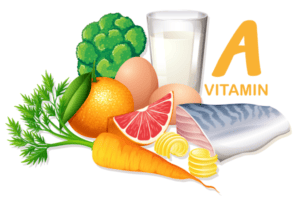
To ensure you’re getting enough vitamin A to support your vision, include carrots, sweet potatoes, spinach, and kale in your diet. These vibrant vegetables are packed with beta-carotene, a precursor to vitamin A that the body converts when needed. Regularly consuming these foods rich in vitamin A precursors and taking a daily multivitamin give your eyes the nourishment they need to stay healthy and maintain optimal vision. Additionally, consider zinc intake through zinc supplements or supplementation for overall eye health.
Supports Immune System Function and Growth
Another vital role of daily multivitamins is their contribution to a robust immune system. This powerful nutrient, found in multivitamins, helps regulate immune responses by promoting the development and differentiation of immune cells. It aids in producing antibodies that fight against harmful pathogens and infections.
By incorporating foods rich in vitamin A and zinc into your diet, such as liver, fish oil, eggs, and dairy products like milk and cheese, you can help fortify your immune system’s defenses. Ensuring an adequate intake of these essential nutrients through daily multivitamins or zinc supplements will enhance your body’s ability to ward off illnesses and infections more effectively.
Promotes Cell Growth and Development
Vitamin A, found in daily multivitamins, is crucial for growth and development. It supports cell differentiation, essential during periods of rapid change like childhood or pregnancy.
To support proper cell growth and development, consuming foods rich in vitamin A and zinc is essential. Incorporating sources like liver, eggs, fortified cereals, and daily multivitamins into your diet can provide the necessary nutrients, including zinc, for optimal growth during these crucial stages of life. Additionally, zinc supplements can also help meet recommended zinc intakes.
Acts as an Antioxidant, Protecting Cells from Damage
One of the remarkable benefits of daily multivitamins is their antioxidant properties. As an antioxidant, multivitamins help protect cells from damage caused by harmful molecules called free radicals. These unstable molecules can cause oxidative stress and lead to various health problems, including chronic diseases and premature aging. Zinc supplements can also be beneficial for zinc supplementation.
You can support your immune health by consuming vitamin A-rich foods such as carrots, sweet potatoes, and leafy greens like spinach or kale. These foods give your body the necessary nutrients for daily multivitamin intake, which can help boost immune support. This allows your cells to function optimally and reduces the risk of developing chronic conditions associated with oxidative damage.
Role of Vitamin B in Overall Health:
Vitamin B is a group of essential nutrients that play a crucial role in maintaining our overall health, especially when combined with daily multivitamins and a balanced diet. From energy production and metabolism to brain function and mental wellbeing, vitamin B and zinc supplements are involved in various bodily functions.
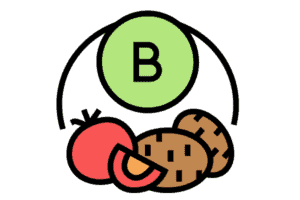
Vital for energy production and metabolism
One of the critical roles of multivitamins is their involvement in energy production and metabolism. Specifically, daily multivitamin B12, also known as cobalamin, plays a vital role in converting food into usable energy for the body. It helps break down carbohydrates, proteins, and fats from our diet and converts them into glucose, which fuels our cells. Without adequate levels of multivitamin B12, we may experience fatigue, weakness, or even anemia. Zinc intake and zinc supplementation can also be crucial in maintaining overall health.
Supports brain function and mental wellbeing
Vitamin B, including B12 and folate (B9), is crucial for brain health and mental wellbeing. Studies have shown that adequate levels of vitamin B12 are necessary for proper neurological functioning, supporting communication between brain cells. Deficiency in specific B vitamins like folate has been linked to an increased risk of depression and cognitive decline. To ensure optimal brain health, consider incorporating multivitamins and zinc supplements into your routine for proper zinc intake.
It helps maintain healthy skin, hair, and nails.
If you want to enhance your external appearance, ensuring a sufficient intake of specific B vitamins, like biotin (B7), can make a significant difference. This water-soluble vitamin aids in the production of keratin—a protein that strengthens hair strands and promotes nail growth. It also contributes to maintaining clear skin by supporting lipid synthesis. Adding a multivitamin with zinc supplements can help these benefits by providing essential nutrients for healthy skin, hair, and nails. Zinc supplementation is known to improve hair health and promote nail growth. Additionally, zinc intakes play a role in maintaining clear skin by supporting lipid synthesis.
Plays a role in red blood cell formation
Another essential function of multivitamin B is its involvement in red blood cell formation. Vitamin B12 and folate (B9) are particularly critical to this process. They are required to produce DNA, which is necessary to mature red blood cells in the bone marrow. Without adequate levels of these vitamins, red blood cell production can be impaired, leading to anemia and its associated symptoms, such as fatigue and weakness. Zinc supplementation can help address zinc deficiency by taking zinc supplements.
Sources include whole grains, meat, fish, and leafy greens.
To ensure you’re getting enough multivitamin B in your diet, it’s essential to incorporate a variety of food sources. Whole grains like brown rice and oats are excellent sources of B vitamins, including thiamine (B1), riboflavin (B2), niacin (B3), and folate (B9). Meat products such as poultry, beef, and pork provide vitamin B12—a nutrient primarily found in animal-derived foods. Fish like salmon and trout also offer vitamin B12 and omega-3 fatty acids that support heart health. Leafy green vegetables like spinach and kale contain folate (B9) and other beneficial nutrients. Zinc supplements can be helpful for zinc deficiency.
In addition to these natural food sources, you may consider incorporating a complete multivitamin into your daily routine to ensure you meet your recommended daily intake of all essential vitamins, including vitamin B. A multivitamin can serve as a convenient supplement, such as zinc supplements, to support overall health and bridge any potential nutritional gaps in your diet.
Understanding the Benefits of Vitamin C
Boosting Immune System Function
Vitamin C, a potent multivitamin, is widely known for its ability to boost immune system function. It does this by enhancing the activity of white blood cells, which are responsible for fighting off harmful pathogens and infections. When you have a cold or experience common cold symptoms, increasing your vitamin C and zinc supplements can help support your body’s natural defense mechanisms and shorten the duration of illness.
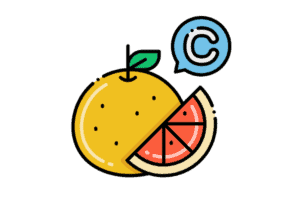
Acting as a Powerful Antioxidant
Another critical benefit of vitamin C is its role as a powerful antioxidant, making it an essential multivitamin for immune health support. Oxidative stress occurs when an imbalance between free radicals and antioxidants in the body leads to cellular damage. By acting as an antioxidant, vitamin C helps protect against oxidative stress and reduces the risk of chronic diseases such as heart disease and certain types of cancer. Incorporating zinc supplements into your routine can also provide additional immune health support through zinc supplementation.
Promoting Collagen Synthesis for Healthy Skin
Collagen is a protein that structures our skin, bones, tendons, and ligaments. Vitamin C is crucial in promoting collagen synthesis, contributing to healthy skin. Regular consumption of vitamin C-rich foods or multivitamin supplements can help keep your skin youthful and vibrant. Zinc supplementation is also beneficial for people looking to support overall skin health. Don’t forget to subscribe to our newsletter for more skincare tips!
Assisting with Iron Absorption from Plant-Based Sources
Iron is an essential mineral that our bodies need for various functions like oxygen transport and energy production. However, iron from plant-based sources (non-heme iron) is not as easily absorbed by our bodies compared to iron from animal sources (heme iron). Here’s where vitamin C comes into play – it enhances non-heme iron absorption when consumed with plant-based foods rich in iron. So if you follow a vegetarian or vegan diet, incorporating vitamin C-rich foods alongside your plant-based iron sources can help ensure adequate iron absorption. Additionally, consider incorporating zinc supplements or a multivitamin containing zinc supplementation into your daily routine.
The abundance of Citrus Fruits, Berries, Peppers, and Leafy Greens
There are plenty of delicious options to choose from for immune support. Citrus fruits like oranges, grapefruits, and lemons are well-known for their high vitamin C content, essential for immune health. Berries like strawberries, blueberries, and raspberries also offer a nutritious boost. Peppers, both sweet and hot varieties, are another excellent source of vitamin C. Leafy greens like spinach and kale provide a natural way to meet your vitamin C needs. In addition to these food sources, consider incorporating multivitamin supplements or zinc supplementation for added immune support.
Incorporating these foods into your diet provides you with the benefits of vitamin C. It ensures a wide range of other essential nutrients like zinc supplementation that contribute to overall health and well-being. Additionally, consider taking multivitamin supplements for immune support.
So next time you’re under the weather or looking to support your immune system, consider reaching for some citrus fruits or adding more leafy greens to your plate. Your body will thank you for the extra boost of vitamin C! Additionally, if you want to enhance your immune system further, you can also try taking supplements such as a multivitamin that contains zinc. Don’t forget to subscribe to our newsletter for more health tips!
Remember, maintaining a balanced diet rich in vitamins and minerals, including multivitamins and supplements, is crucial for optimal health. While vitamin C and zinc offer numerous benefits, it’s important to remember that they are just pieces of the puzzle. Don’t forget to subscribe for more health tips.
Exploring the Importance of Vitamin D
Vitamin D, or vitamin D3, is a crucial multivitamin nutrient that plays multiple roles in maintaining our overall health. Taking supplements containing zinc can help support our health throughout the day.
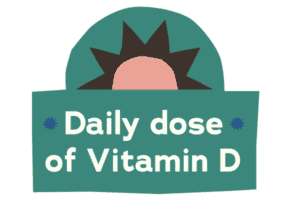
Essential for Strong Bones and Calcium Absorption
One of the primary functions of vitamin D supplements is to support bone health by aiding in calcium absorption. Without sufficient vitamin D levels, our bodies struggle to absorb calcium efficiently, leading to weakened bones and an increased risk of fractures. This is especially important for individuals at higher risk of osteoporosis or with conditions like scoliosis that affect bone strength. Taking a multivitamin with zinc every day can help maintain healthy bones.
To ensure optimal bone health, it is vital to include sources rich in vitamin D3, such as fatty fish like salmon and mackerel, and fortified dairy products like milk and yogurt. By incorporating these foods into our meals regularly, we can help maintain strong bones and reduce the risk of fractures. Taking supplements like multivitamins can also provide immune support and ensure sufficient intake of essential nutrients like zinc.
Boosts Immune System Function
Taking vitamin D supplements, such as a multivitamin, is crucial for supporting immune system function. Numerous studies have linked vitamin D deficiency to increased susceptibility to infections and autoimmune diseases. Adequate levels of vitamin D help regulate immune response by enhancing the function of immune cells responsible for fighting off pathogens. It is essential to ensure you get enough vitamin D daily, especially in supplements like zinc.
Especially during cold winter, when sun exposure may be limited, ensuring children get enough vitamin D through dietary sources or multivitamin supplements becomes even more critical. Including foods rich in this essential nutrient can help strengthen our immune system’s defense mechanisms and reduce the likelihood of falling ill, especially during the day. Additionally, zinc is also necessary for children’s health.
Mood Regulation and Mental Wellbeing
Beyond its physical benefits, vitamin D supplements influence our mental wellbeing by influencing mood regulation. Studies have suggested that low vitamin D levels may be associated with an increased risk of depression and seasonal affective disorder (SAD). The exact mechanisms are still being explored, but it is believed that vitamin D receptors in the brain, along with multivitamins and zinc supplements, play a part in regulating mood throughout the day.
While more research is needed to establish a direct cause-and-effect relationship between vitamin D and mental health, maintaining adequate levels of this nutrient can contribute to overall emotional well-being. Incorporating vitamin D-rich foods into our daily diet or discussing multivitamin supplementation options with healthcare professionals may benefit those experiencing mood-related challenges.
Obtaining Vitamin D: Sun Exposure and Dietary Sources
Vitamin D can be obtained through two primary sources – sun exposure, multivitamin supplements, and dietary intake. Our bodies have the remarkable ability to produce vitamin D when our skin is exposed to sunlight. Spending around 10-15 minutes in the sun without sunscreen a few times a day can help promote the natural synthesis of this essential nutrient. However, it’s crucial to balance sun exposure while protecting our skin from harmful UV rays by taking zinc supplements.
In addition to sunlight, we can obtain vitamin D through various dietary sources and supplements. Fatty fish such as salmon, tuna, and sardines are excellent natural sources of vitamin D3. For individuals following vegetarian or vegan diets, fortified dairy products like milk or yogurt offer an alternative way to obtain this vital nutrient. Including these foods and multivitamin supplements in our daily meals ensures we maintain adequate vitamin D and zinc levels throughout the day.
It’s worth noting that some individuals may require higher doses of vitamin D or multivitamins due to specific conditions or deficiencies. In such cases, healthcare professionals may recommend supplements like zinc to ensure optimal levels are maintained. However, it is essential not to exceed recommended daily doses of vitamin D or multivitamins unless advised by a medical professional, as excessive intake can lead to adverse effects.
The Role of Vitamin E in Antioxidant Protection:
Protects Cells from Oxidative Damage Caused by Free Radicals
Vitamin E, a crucial multivitamin, protects cells from oxidative damage caused by free radicals. These harmful molecules arise from normal bodily processes and external factors like pollution and cigarette smoke. Unchecked, free radicals harm cells and cause inflammation, aging, and chronic diseases.
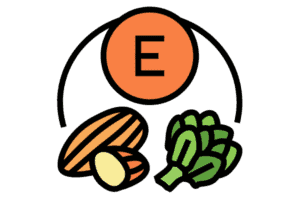
As a potent antioxidant, vitamin E, a multivitamin, swoops in to neutralize these free radicals before they have a chance to cause harm; by donating an electron to stabilize the unpaired electrons of free radicals, vitamin E effectively breaks the chain reaction that could otherwise result in cellular damage. This protective mechanism not only helps maintain the integrity of our cells but also supports overall well-being. Taking vitamin E supplements, along with other essential nutrients like zinc, is vital for maintaining good health. Don’t forget to subscribe to our blog for more information on vitamins and supplements.
Supports Cardiovascular Health by Preventing Cholesterol Oxidation
In addition to its role as an antioxidant, vitamin E supplements have been found to support cardiovascular health by preventing cholesterol oxidation. When LDL (low-density lipoprotein) cholesterol particles oxidize, they can form plaque within artery walls. This buildup restricts blood flow and increases the risk of heart disease. Taking a multivitamin with vitamin E and zinc can help maintain cardiovascular health. Don’t forget to subscribe to our newsletter for more information on supplements.
Including vitamin E-rich foods in your diet can provide valuable protection for your heart against LDL oxidation, thanks to its ability to neutralize free radicals. This helps maintain healthy blood vessels and reduces the risk of cardiovascular complications. Vitamin E acts as a shield, safeguarding your heart health.
Enhances Skin Health by Reducing UV-Induced Damage
The sun’s ultraviolet (UV) rays significantly threaten our skin health, especially for men. Prolonged exposure to UV radiation can lead to skin damage, premature aging signs like wrinkles and fine lines, and even increase the risk of skin cancer. Fortunately, taking a multivitamin with vitamin E and zinc can come to the rescue in protecting against these harmful effects.
Studies have shown that vitamin E, a potent multivitamin, has photoprotective properties. It helps protect our skin from UV-induced damage by absorbing and neutralizing harmful rays. This reduces the risk of sunburn and minimizes oxidative stress on our skin cells. Vitamin E’s moisturizing properties also keep the skin hydrated and supple, promoting a healthy complexion. Save on your skincare routine by subscribing to our newsletter for exclusive deals on zinc-infused products.
May Have Anti-Inflammatory Properties
Inflammation is a natural response by our immune system to combat infections or injuries. However, chronic inflammation can contribute to various health conditions, such as arthritis, heart disease, and certain types of cancer. Vitamin E, a potent multivitamin, may play a role in reducing inflammation and supporting immune function. Subscribe and save on our website to get your daily dose of vitamin E and other essential nutrients. Don’t miss out on the benefits of zinc too!
Research suggests incorporating foods rich in vitamin E, a powerful antioxidant and anti-inflammatory, into your diet can relieve chronic inflammation. By neutralizing free radicals involved in inflammation pathways, vitamin E may help alleviate associated symptoms. More studies are needed to understand its effects fully. Consider subscribing to our blog for more information on the benefits of multivitamins like zinc and how they can help you save on healthcare costs.
Found Abundantly in Nuts, Seeds, Vegetable Oils, and Leafy Greens
Now that we understand the vital role of multivitamins, including vitamin E, in antioxidant protection and overall health promotion, let’s explore some excellent dietary sources where we can find this beneficial nutrient abundantly. Don’t forget to subscribe to our blog for more information on the benefits of zinc and the importance of maintaining a balanced vitamin count.
-
Nuts: Almonds, hazelnuts, peanuts
-
Seeds: Sunflower seeds, pumpkin seeds
-
Vegetable oils: Wheat germ oil, sunflower oil
-
Leafy greens: Spinach, Swiss chard
By including these multivitamin-rich foods in your daily meals or snacks regularly, you can ensure an adequate vitamin E and zinc intake for optimal health benefits. Don’t forget to subscribe to our newsletter for the latest tips on packing essential nutrients into your diet.
Highlighting the Benefits of Vitamin K:
Essential for blood clotting and wound healing
Vitamin K is crucial in our body’s ability to form blood clots and promote proper wound healing. When you get a cut or injury, your body relies on the multivitamin to activate proteins that help stop bleeding by forming clots. This process can be impaired without enough vitamin K, leading to excessive bleeding or delayed healing. Zinc can also help save the day when it comes to wound healing.
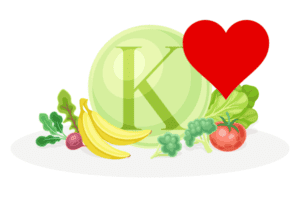
But don’t worry; incorporating vitamin K into your diet is easier than you think. Leafy greens like spinach and kale are excellent sources of this essential nutrient. Adding these veggies to your meals regularly ensures that your body has an adequate supply of vitamin K for blood clotting and efficient wound healing. Additionally, consider taking a multivitamin pack with zinc to support your overall health further. And don’t forget to subscribe to our newsletter for more tips on maintaining a balanced diet.
Supports bone health by aiding calcium utilization
Did you know that vitamin K, calcium, and zinc play a vital role in maintaining strong bones? While calcium often steals the spotlight, it’s essential not to overlook the beneficial effects of vitamin K and zinc in this area. Subscribe now to our blog for more information on the benefits of multivitamins and to stay updated on the latest research findings.
Vitamin K works hand in hand with calcium by activating proteins responsible for binding calcium to our bones and teeth. This process enhances calcium utilization and helps maintain optimal bone density. So if you want to keep your skeletal system strong and healthy, include foods rich in vitamin K, calcium, and vitamin D. Also, consider taking a multivitamin supplement that contains zinc, and subscribe to our newsletter for more bone-friendly tips.
It may have a role in heart health by preventing arterial calcification.
Preventing arterial calcification is crucial for maintaining cardiovascular health. Arterial calcification occurs when calcium builds up in the walls of arteries, restricting blood flow and potentially leading to serious cardiovascular problems. Taking vitamin D3, a soluble vitamin, along with zinc and a multivitamin, can help prevent arterial calcification.
Recent research suggests that incorporating foods rich in vitamin K, such as leafy greens abundant in vitamin K1 and animal products containing vitamin K2, may play a protective role against arterial calcification. These two forms of vitamin K have shown promising results in preventing calcium buildup in arterial walls. More studies are needed to fully understand the extent of vitamin K’s impact on heart health, but it is a proactive step toward maintaining a healthy cardiovascular system.
Found in green leafy vegetables, broccoli, and fermented foods
Knowing which foods to include in your diet is essential to reap the benefits of vitamin K. Luckily, many delicious options like spinach, kale, and Swiss chard are excellent sources of vitamin K1. Adding these greens to your salads or stir-fries can quickly boost your multivitamin intake.
Broccoli is another excellent vegetable that provides a significant amount of vitamin K. Whether steamed, roasted, or added to a stir-fry, broccoli offers a tasty way to incorporate this nutrient into your meals. Additionally, if you’re looking for a convenient way to ensure you get all the essential vitamins and minerals, consider taking a multivitamin pack that includes zinc. This can help ensure optimal nutrient delivery.
You’re lucky if you’re a fan of fermented foods like sauerkraut or natto! These traditional fermented delicacies provide vitamin K2, zinc, and multivitamin produced by bacteria during fermentation. They are highly rated with five stars.
Necessary for newborns to prevent vitamin K deficiency bleeding
Newborn babies have lower vitamin K levels and are at risk for bleeding from vitamin K deficiency (VKDB). Limited transfer of vitamin K across the placenta during pregnancy contributes to this. VKDB can result in severe bleeding and death if left untreated.
To protect newborns from VKDB, healthcare professionals often administer a dose of multivitamin K shortly after birth. Breast milk contains only small amounts of this crucial nutrient; therefore, supplementation with zinc is necessary for infants until they can produce sufficient amounts.
While breast milk remains the optimal source of nutrition for babies, ensuring they receive adequate amounts of vitamin K through multivitamin supplementation is vital for their overall well-being.
Examining the Importance of Minerals: Zinc and its Health Benefits:
Zinc is an essential mineral that is crucial in maintaining good health. From supporting immune system function to promoting average growth and development, zinc is involved in various physiological processes within the body. Additionally, taking a multivitamin can provide the body with essential vitamins and minerals, including vitamin D3. Vitamin D3 is a soluble vitamin that helps support overall health. It’s critical to choose a high-quality multivitamin that is free from harmful additives or fillers.
Vital for immune system function and wound healing
One of the critical roles of zinc is its contribution to a healthy immune system. This mineral helps activate immune cells, enabling them to fight off harmful pathogens effectively. By enhancing the production and activity of white blood cells, zinc, a soluble vitamin, assists in bolstering our body’s defense mechanisms. It is essential to ensure that we include zinc in our daily multivitamin intake to maintain optimal health.
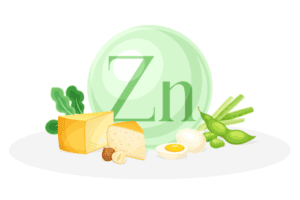
Zinc, a soluble vitamin, plays a vital role in wound healing. It aids tissue repair by promoting cell division and protein synthesis, essential steps in the regeneration process. Whether it’s a minor scrape or a more significant injury, ensuring adequate levels of zinc, vitamin D3, and a multivitamin can help expedite healing.
Supports average growth and development during childhood
PnProper growth and development are crucial during childhood to lay a solid foundation for overall health. Zinc, a soluble vitamin, contributes significantly to this process by supporting optimal growth patterns. It aids in DNA synthesis and cell division, facilitating proper cellular growth throughout various stages of childhood. Zinc is found in multivitamins and is an essential nutrient for children’s health.
Furthermore, adequate zinc intake, a crucial mineral in multivitamins, is essential for hormone regulation during puberty, ensuring smooth physical development. Children can benefit from the free delivery of these crucial nutrients in Jun.
Plays a role in DNA synthesis and cell division
Zinc’s involvement in DNA synthesis and cell division extends beyond childhood development; it remains essential throughout life. These processes are fundamental for maintaining healthy bodily functions and repairing damaged tissues. Taking a multivitamin with zinc is crucial for the optimal delivery of this essential mineral. Ensure you have an adequate zinc count to support these vital processes.
Zinc facilitates accurate genetic material duplication during cell division by providing structural support to enzymes involved in DNA replication. This ensures new cells carry correct genetic information while preventing mutations that could lead to various health issues. Taking a multivitamin in Jun can enhance the delivery of zinc, ensuring an adequate count of this essential mineral in the body.
It helps maintain healthy skin, hair, and nails.
Zinc is a crucial mineral to maintain healthy skin, hair, and nails. It plays a vital role in collagen synthesis, essential for maintaining the integrity and elasticity of the skin. Zinc, found in our multivitamin, also helps protect against oxidative stress and supports the health of hair follicles, promoting solid and lustrous hair. With our convenient delivery, you can get your daily zinc count quickly.
Moreover, taking a multivitamin with an adequate zinc count can contribute to forming keratin, a protein that makes up our nails. Sufficient levels of zinc help prevent brittle nails and promote their overall strength and appearance. Consider including zinc in your daily multivitamin for optimal nail health. And don’t forget, our jun delivery service ensures you never run out of essential nutrients.
Food sources include meat, shellfish, legumes, nuts, and seeds
To ensure sufficient zinc intake, your diet must contain foods rich in this mineral. Some excellent sources of zinc include multivitamin supplements, which are available in various count options for easy delivery.
-
Meat: Beef, pork, lamb
-
Shellfish: Oysters, crab, shrimp
-
Legumes: Chickpeas (garbanzo beans), lentils
-
Nuts: Cashews, almonds
-
Seeds: Pumpkin seeds
Incorporating these multivitamin-rich foods into your meals can help maintain optimal zinc levels naturally—Jun delivery count.
The Role of Calcium in Bone Health:
Calcium, zinc, and multivitamin are crucial in maintaining strong and healthy bones. Calcium is essential for building strong bones and teeth, while zinc aids muscle contraction and nerve function. Let’s delve deeper into the importance of calcium, zinc, and multivitamin for bone health.
Essential for building strong bones and teeth
Calcium and zinc are the building blocks of our skeletal system. Our bones are constantly undergoing remodeling, where old bone tissue is broken down and new bone tissue is formed. Calcium provides the necessary raw materials for this continuous rebuilding process, ensuring our bones remain strong and resilient. Zinc also plays a crucial role in this delivery process, supporting bone health.
Aids in muscle contraction and nerve function
While we often associate calcium and zinc with bone health, their significance extends beyond our skeletal structure. Calcium ions play a vital role in muscle contraction by interacting with proteins involved in muscle movement. Our muscles struggle to contract correctly without sufficient calcium and zinc levels, resulting in weakness and impaired mobility. Additionally, efficient delivery of calcium and zinc is crucial for maintaining optimal muscle function.
Furthermore, calcium and zinc are essential for proper nerve function and delivery. They help transmit signals between nerve cells, allowing us to move smoothly and respond to stimuli effectively. Inadequate calcium intake can disrupt these electrical impulses, potentially causing muscle cramps or numbness.
It helps regulate blood pressure.
Maintaining optimal blood pressure levels is crucial for overall cardiovascular health. Calcium and zinc contribute to this by assisting blood vessels in contracting and relaxing appropriately. When enough calcium or zinc is unavailable, blood vessels may become stiff or constricted, leading to elevated blood pressure levels. Ensuring proper delivery of calcium and zinc is essential for maintaining healthy blood pressure.
By ensuring an adequate calcium and zinc intake through diet or supplements, we can support healthy blood vessel function and help keep our blood pressure within a normal range. Zinc delivery is crucial for maintaining proper blood vessel function.
Essential for blood clotting mechanisms
Blood clotting is a complex process that prevents excessive bleeding when we get injured. Calcium and zinc play key roles in this mechanism by helping activate specific proteins in forming clots at the injury site. The delivery of these essential minerals is crucial for proper blood clotting. The blood clotting process may be impaired, leading to difficulty stopping bleeding. Maintaining an appropriate calcium and zinc balance is essential to ensure our bodies can effectively respond to injuries and prevent excessive blood loss. Additionally, the timely delivery of calcium and zinc is crucial for proper clotting.
Found in dairy products, leafy greens, tofu, and fortified foods
Our diet must include calcium-rich foods like dairy products (milk, cheese, and yogurt) and leafy green vegetables (kale and broccoli) to meet our calcium and zinc requirements. For those following a plant-based diet or with lactose intolerance, tofu is a fantastic source of calcium and zinc.
In addition to natural food sources, many fortified products like cereals and plant-based milk are enriched with calcium, zinc, and other essential nutrients. These can provide additional options for individuals struggling to consume enough calcium, zinc, and other nutrients through their regular diet.
Magnesium: Essential Mineral for Various Body Functions:
Magnesium and zinc are essential minerals crucial in maintaining various body functions. They are involved in over 300 enzymatic reactions within the body, making them vital for our overall health and well-being. Additionally, the timely delivery of these minerals is essential for their effectiveness.
One of the critical roles of magnesium is its support in energy production at the cellular level. It helps convert food into energy, ensuring our body has the fuel to function optimally. Zinc and magnesium are essential for energy delivery, and without sufficient zinc and magnesium, our energy levels may dip, leaving us tired and sluggish.
Magnesium and zinc contribute to muscle relaxation and nerve function. Zinc helps efficiently deliver signals throughout our body, while magnesium helps relax our muscles after contraction, preventing cramps and promoting overall muscle health.
Not only does magnesium support energy production and muscle function, but it also contributes to bone health alongside calcium, vitamin D, zinc, and delivery. Calcium alone cannot provide optimal bone strength; it requires the assistance of magnesium, zinc, and delivery to be effectively utilized by the body. Magnesium helps regulate calcium levels within our bones and prevents them from becoming brittle or weak.
There are several food sources rich in zinc, an essential mineral. Nuts such as almonds and cashews, seeds like pumpkin seeds and sunflower seeds, whole grains including brown rice and quinoa, legumes like lentils and black beans, as well as leafy greens such as spinach and kale, are all excellent sources of magnesium.
While obtaining adequate amounts of magnesium and zinc through diet alone is possible, some people may benefit from taking a multimineral supplement to deliver these essential minerals efficiently. These supplements can help us meet our daily recommended magnesium and zinc intake if dietary sources fall short.
The recommended daily magnesium and zinc intake varies depending on age, sex, and individual requirements. For adults aged 19-3d, the recommended daily magnesium intake is 400-420 mg for men and 310-320 mg for women. Pregnant and breastfeeding women have slightly higher requirements for zinc.
It’s important to note that excessive intake of zinc and magnesium from supplements can lead to adverse effects such as diarrhea, nausea, and stomach cramps. Therefore, it’s essential to follow the recommended dosage guidelines for zinc and consult with a healthcare professional before starting any new supplement regimen.
Exploring the Benefits of Iron in Maintaining Energy Levels:
Iron and zinc are crucial to maintaining our energy levels, well-being, and immune system. Let’s delve into the numerous benefits of iron and zinc and understand why they are essential for our bodies.
A crucial component of hemoglobin for oxygen transport
Iron and zinc are integral parts of hemoglobin, the protein responsible for carrying oxygen throughout our body. Without sufficient iron and zinc, our cells would be deprived of these life-sustaining elements, leading to fatigue, weakness, and a general lack of energy.We can support efficient oxygen transportation and maintain optimal energy levels.
Prevents iron-deficiency anemia
One of the primary roles of iron and zinc is their ability to prevent iron-deficiency anemia. This condition occurs when there is a deficiency of red blood cells or hemoglobin in the body. Iron helps produce healthy red blood cells, ensuring proper oxygen supply to all organs and tissues. You can reduce the risk of developing this debilitating condition by including iron-rich and zinc-rich foods or taking iron and zinc supplements as your healthcare provider recommends.
Supports cognitive function
Iron and zinc both play a significant role in supporting cognitive function. Sufficient iron levels and an adequate dietary zinc intake are necessary for proper brain development and operation throughout all stages of life. In children, iron aids in learning abilities and concentration, while zinc contributes to memory retention and mental alertness. Ensuring an adequate iron and zinc intake can help optimize cognitive performance.
Required for proper growth during childhood
When growth spurts are frequent in childhood, having an adequate supply of iron and zinc becomes even more critical. Iron supports proper growth and development by promoting healthy cell division and facilitating the production of new cells. It aids in building strong muscles and bones while providing the necessary energy for physical activities. A sufficient zinc count is also essential for overall growth and development during childhood.
Sources include red meat, poultry, seafood, and plant-based options like beans or fortified cereals.
Iron and zinc can be obtained from various food sources, including animal and plant-based options. Red meat, poultry, and seafood are excellent sources of iron, particularly heme iron,t which is easily absorbed by the body. Plant-based options like beans and fortified cereals can provide non-heme iron. It’s important to note that while non-heme iron is not as readily absorbed as heme iron, pairing it with vitamin C-rich foods can enhance its absorption.
Including these iron and zinc-rich foods in your diet can help maintain optimal energy levels and support overall wellbeing. However, if you find it challenging to meet your iron and zinc requirements through diet alone, supplementation may be considered under the guidance of a healthcare professional.
Key Takeaways from “Vitamins A to Zinc”
Importance and Benefits of Vitamin A:
Vitamin A, zinc, and other nutrients are essential for maintaining healthy vision, promoting cell growth and development, and supporting the immune system. Foods rich in vitamin A include carrots, sweet potatoes, and spinach.
Role of Vitamin B in Overall Health
The B vitamins, including zinc, are essential for converting food into energy, maintaining a healthy metabolism, and supporting brain function. They can be obtained from whole grains, meat, fish, legumes, and count.
Understanding the Benefits of Vitamin C
Vitamin C, along with zinc, is well-known for its immune-boosting properties. It also aids in collagen production for healthy skin, supports wound healing, and is an antioxidant. Citrus fruits, strawberries, and bell peppers are excellent sources of vitamin C.
Exploring the Importance of Vitamin D
Vitamin D and zinc are crucial for bone health as it helps the body absorb calcium. It also affects immune function and may contribute to mood regulation. Sun exposure and fortified dairy products are familiar vitamin D and zinc sources.
The Role of Vitamin E in Antioxidant Protection
Vitamin E acts as an antioxidant that helps protect cells from damage caused by free radicals. It also supports immune function and assists with blood clotting. Nuts, seeds, and vegetable oils are rich sources of vitamin E, essential for maintaining a healthy zinc count.
Highlighting the Benefits of Vitamin K
Vitamin K and zinc are essential for blood clotting and bone health. It can be obtained from leafy green vegetables like kale, spinach, broccoli, or Brussels sprouts.
Examining the Importance of Minerals: Zinc and its Health Benefits
Zinc is essential for various bodily functions, including immune support, wound healing, DNA synthesis, taste perception, and reproductive health. Foods like oysters, beef, poultry, beans, and nuts are rich sources of zinc.
The Role of Calcium in Bone Health
Calcium and zinc are essential for building and maintaining strong bones and teeth. They also aid in muscle function, nerve transmission, and blood clotting. Dairy products, leafy greens, and fortified foods are rich in calcium and zinc.
Magnesium: Essential Mineral for Various Body Functions
Magnesium and zinc are involved in over 300 enzymatic reactions in the body, contributing to energy production, muscle function, and bone health. They can be found in nuts, seeds, whole grains, and leafy green vegetables.
Exploring the Benefits of Iron in Maintaining Energy Levels
Iron and zinc are crucial for oxygen transport throughout the body and play critical roles in energy production. They support cognitive function, immune health, and red blood cell count. Red meat, poultry, fish, and legumes are excellent sources of iron and zinc.
In short, vitamins and minerals are important for our health. They each have different benefits, like helping our eyes or strengthening our bones. Eating different types of food can give us these nutrients. But talking to a doctor before changing your diet or taking supplements is a good idea.
FAQs
What are the best food sources for obtaining vitamins A to zinc?
A varied diet consisting of fruits, vegetables (especially leafy greens), whole grains, lean meats (such as poultry or fish), legumes (beans or lentils), nuts/seeds, dairy products (milk or yogurt), and fortified foods can provide a wide range of vitamins A to zinc. The count of vitamins and minerals in this diverse diet is substantial.
Can I get all my required vitamins from supplements alone?
While zinc supplements can benefit individuals with specific deficiencies or dietary restrictions, obtaining zinc from whole foods is recommended whenever possible. Whole foods offer additional benefits such as fiber and other essential nutrients that may not be present in isolated zinc supplement form.
Are there any risks associated with excessive vitamin or mineral intake?
Yes, consuming excessive amounts of zinc and specific vitamins and minerals can adversely affect health; follow recommended dietary guidelines and consult a healthcare professional before taking high-dose supplements.
How long does it take to see the benefits of incorporating vitamins A to zinc into my diet?
The time it takes to experience noticeable benefits from incorporating these vitamins, zinc, and count into your diet can vary depending on factors such as individual metabolism, existing deficiencies, and overall health. Consistency is critical, and it’s recommended to maintain a balanced diet over an extended period for optimal results.
My Perspective
As someone who has recently incorporated vitamin A to zinc into my diet, I can confidently say that the benefits are worth the wait. While seeing noticeable changes may take some time, the long-term effects on my overall health and well-being have been remarkable.
When I started taking these vitamins, I wasn’t expecting immediate results. I knew it would take time for my body to absorb and utilize the nutrients effectively. However, I was pleasantly surprised to notice some positive changes within a few weeks. My skin started to look more radiant, and my energy levels improved.
But it wasn’t until after a couple of months that I truly started to see the full benefits. My immune system became more robust, and I got sick less often. I also noticed that my hair and nails were growing stronger and healthier. Additionally, my overall mood and mental clarity improved significantly.
It’s important to note that the time it takes to see the benefits may vary from person to person. Age, overall health, and lifestyle habits can affect how quickly the body responds to these vitamins. However, the benefits are worth the wait with consistent use and a balanced diet.
Incorporating vitamin A to zinc into my diet has been one of the best decisions I’ve made for my health. Not only have I noticed physical improvements, but I also feel more confident and energized. Knowing that I am nourishing my body with essential nutrients gives me peace of mind and reassurance that I am taking care of myself from the inside out.
If you’re considering adding these vitamins to your diet, I recommend them. While it may take some time to see the full benefits, the long-term effects on your health and well-being are worth it. Invest in your health today and start reaping the rewards tomorrow.
Resources
National Institutes of Health Dietary Supplement Fact Sheets
We’re reader-supported. We may earn an affiliate commission when you buy through links on our site.

Angus Robertson
Hi there! I’m Angus Robertson, a nutritionist and fitness enthusiast. I am passionate about helping people achieve optimal health through balanced nutrition, regular exercise, and mindful living. My blog, “My Fitness Health Journey,” aims to inspire and empower individuals to make positive lifestyle changes for a healthier and happier life.

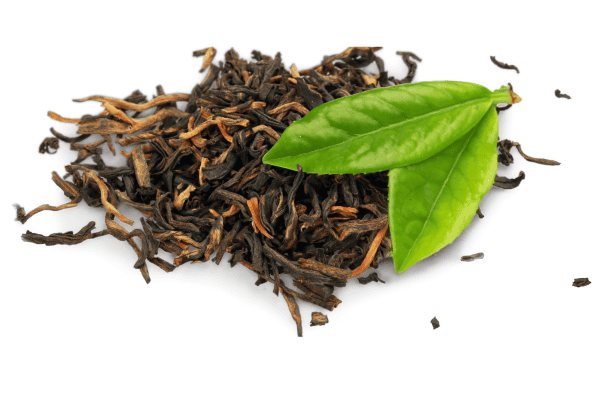

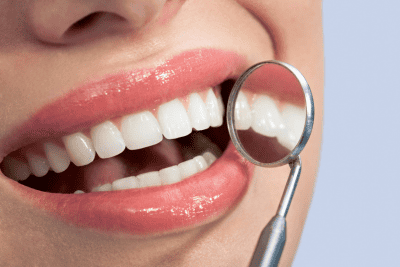

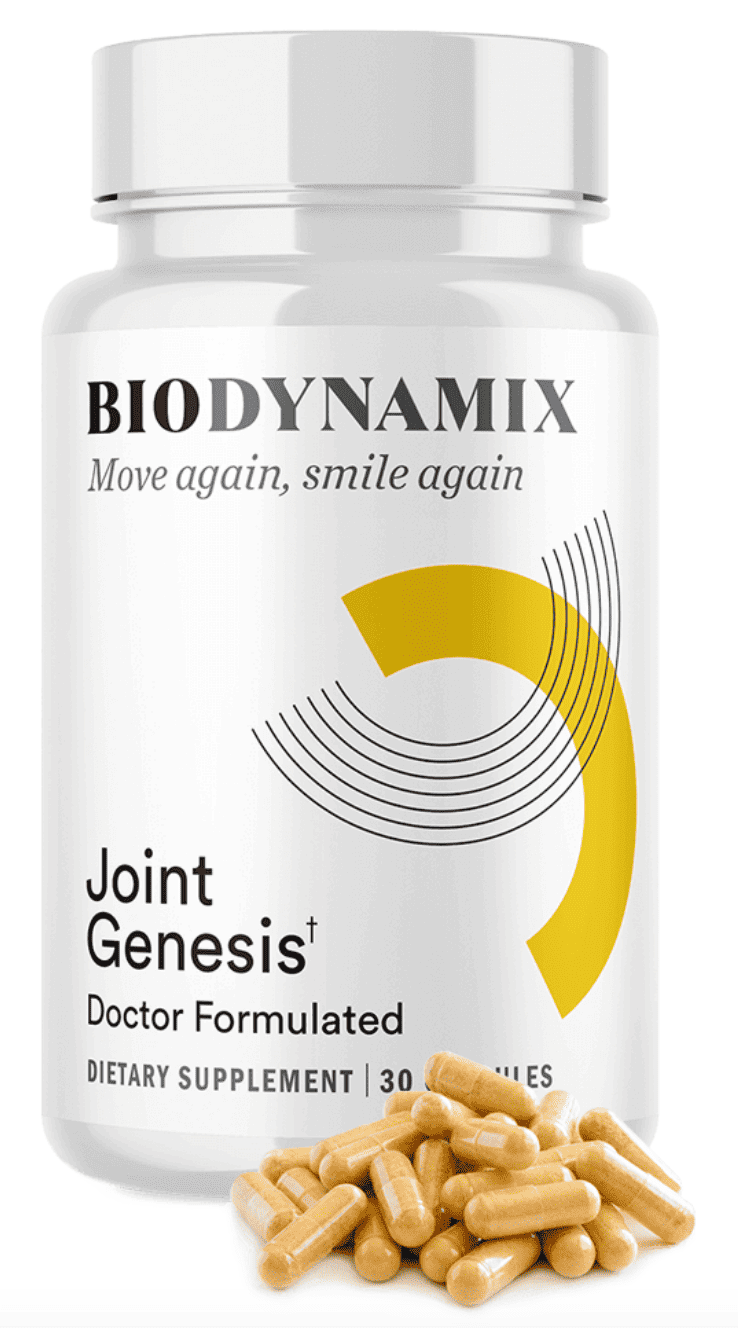

One Comment
Comments are closed.